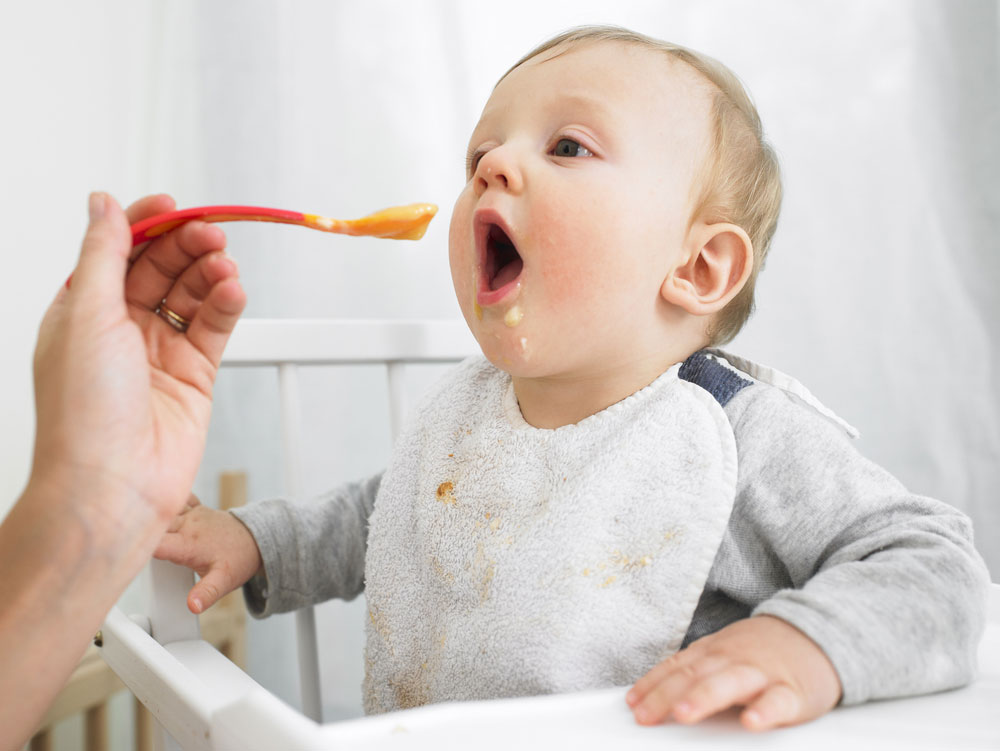Most Mothers Give Infants Solid Food Too Early

More than a third of U.S. mothers start feeding their infants solid food too soon, a new study finds.
In the study, 40 percent of mothers said they gave their infants solid foods before the age of 4 months, which is earlier than recommended. About 24 percent of mothers who breast-fed, and 53 percent of mothers who formula-fed, gave their babies solid food too early.
At the time the study was conducted (between 2005 and 2007), the American Academy of Pediatrics recommended infants start solid foods no earlier than 4 months. Currently, the AAP recommends waiting until 6 months. Until that time, the AAP recommends breast milk as the sole food for infants (along with necessarily vitamin supplements).
The new findings are concerning because infants may not be developmentally ready for solid foods before 4 months of age (they may have troubling eating and swallow the food properly), the researchers said. Studies have also linked the early introduction of solid foods with an increased risk of chronic diseases later in life, such as obesity and eczema. In addition, starting babies on solid foods early may reduce the duration of breastfeeding, and breastfeeding itself has been shown to have many health benefits for kids.
The findings highlight the need for better communication about when mothers should start their infants on solid foods, and the risks of giving these foods too early, said study researcher Kelley Scanlon, an epidemiologist at the Centers for Disease Control and Prevention's Division of Nutrition, Physical Activity and Obesity.
The study surveyed 1,334 women before they gave birth, and nearly every month during the first year of the baby's life. Moms were asked to report any solid foods their babies ate in the last week.
The most common reason mothers gave for starting their babies on solid food before 4 months was "My baby was old enough to begin eating solid food." This shows that "A large proportion of women are not aware that that is too early," Scanlon said.
Get the world’s most fascinating discoveries delivered straight to your inbox.
Other reasons were: "My baby seemed hungry a lot of the time," "My baby wanted the food I ate," and "I wanted to feed my baby something in addition to breast milk or formula." More than 50 percent of mothers in the study said a doctor told them their baby could start solid food before 4 months.
Mothers may turn to a variety of sources for information on when to start their infants on solid foods, and these sources may provide conflicting advice, the researchers said. In addition, many health care providers say they have inadequate training on infant feeding practices.
"Pediatricians and other health care providers need to provide clear and accurate guidance" to women about when to start solid foods "and support them carrying out that recommendation," Scanlon said.
For instance, some women may start their infant on solid foods sooner because they think that their babies' crying indicates they are still hungry. But babies cry for a lot of reasons, and better interpretation of these cries (with the help of a doctor) may prevent some women from starting solid foods too early, Scanlon aid.
Because the study participants were predominantly white and had a moderate income, the findings may not apply to the population as a whole. In fact, because mothers of lower socioeconomic status are at higher risk of starting solid food early, the new findings could be an underestimate, the researchers said.
The study is published today (March 25) in the journal Pediatrics.
Follow Rachael Rettner @RachaelRettner. Follow MyHealthNewsDaily @MyHealth_MHND, Facebook & Google+.

Rachael is a Live Science contributor, and was a former channel editor and senior writer for Live Science between 2010 and 2022. She has a master's degree in journalism from New York University's Science, Health and Environmental Reporting Program. She also holds a B.S. in molecular biology and an M.S. in biology from the University of California, San Diego. Her work has appeared in Scienceline, The Washington Post and Scientific American.
 Live Science Plus
Live Science Plus





